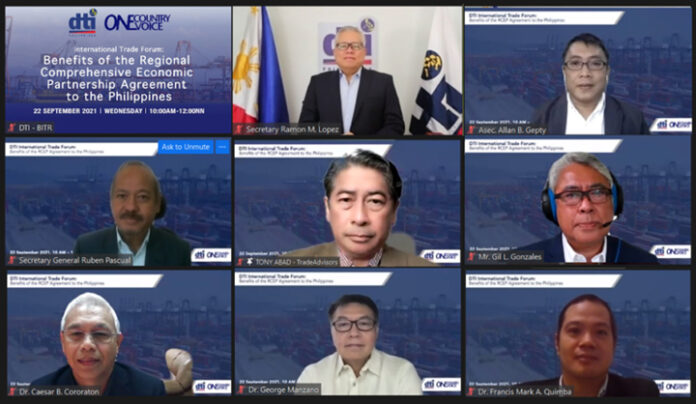
The Department of Trade and Industry (DTI) recently hosted the “International Trade Forum: Benefits of the Regional Comprehensive Economic Partnership [RCEP] Agreement to the Philippines” in a bid to raise awareness on the opportunities presented by the trade pact.
Attended by over 300 participants, the forum is the first in a series of webinars on RCEP that the DTI is spearheading to inform stakeholders of the agreement, which was signed on November 15, 2020, by the 10 member-states Asean, Australia, China, Japan, Korea and New Zealand.
Panelists from the government, private sector and academe recognized the opportunities that RCEP presents to the Philippines, and called for its timely ratification to ensure that businesses, including micro, small and medium enterprises (MSME), will be able to realize the opportunities of the agreement as soon as possible, and help with the country’s post-pandemic economic recovery efforts.
In his opening remarks, Trade Secretary Ramon M. Lopez noted the importance of continued information campaigns in ensuring that stakeholders have the requisite information to fully utilize the RCEP agreement:
“Starting with this forum, the DTI is also set to intensify the promotion of RCEP to raise awareness and disseminate information to stakeholders as we move closer to the target date to implement this agreement,” Lopez said. “We will work with our partners in promoting RCEP as we believe the Philippines will only be able to reap its benefits if we fully utilize the agreement.”
Dr. Caesar Cororaton, senior research fellow at the Virginia Polytechnic Institute and State University in the United States, highlighted that the RCEP is generally beneficial to the Philippine economy with initial findings reflecting improved trade balance, increased welfare, and lower poverty incidence as early as its entry-into-force with significant improvements by 2030.
In particular, the RCEP is initially estimated to improve the country’s trade balance by as much as $51.7 million, increase overall welfare by $573.7 million, contribute to a 0.84- percent real GDP growth, and lower poverty incidence by 4.97 percent in 2030. This was supported by the initial findings of the study of Dr. Francis Mark Quimba, senior research fellow at the Philippine Institute for Development Studies, which showed that the non-participation or delayed participation of the Philippines to the agreement would negatively affect the economy.
Dr. Quimba also emphasized that while East Asian countries stand to benefit the most in terms of increase in exports, the Philippines and Vietnam will gain the most in terms of real GDP due to lower trade costs and higher factory gate prices.
Dr. George Manzano, dean of the School of Economics of the University of Asia and the Pacific, also emphasized the important role of the RCEP in facilitating the industries’ participation in the Global Value Chain (GVC) highway and further embedding the country in the Asia-Pacific trading system—one of the most lucrative economic and trading regions in the world.
For his part, Atty. Anthony A. Abad, chief executive officer of TradeAdvisors, stressed that the Philippines should step away from a protectionist mindset and instead, seek to emulate the trade openness of China and Vietnam, who have significantly reduced their poverty levels as soon as they opened their markets to trade.
On the need to strengthen government and private sector collaboration, Mr. Gil Gonzales, executive director of the Asean Business Advisory Council (Asean-BAC), and Secretary-General Ruben Pascual of the Philippine Chamber of Commerce and Industry welcomed the call for partnership and expressed their commitment to working with the government in ensuring that the agreement is fully utilized by the business community, including MSMEs. According to Mr. Gonzales, “The RCEP agreement needs to be at the center of the government’s economic agenda to fully reap its benefits.”
Assistant Secretary Allan B. Gepty, for his part, said RCEP should be viewed not only as a plain trade agreement that provides enhanced market access and stable business environment, but also as a strategic tool to sustain the region’s economic advantage, noting that the RCEP region is the center of economic activities in the world.
“The Philippines needs to be part of the RCEP free-trade area lest it will be left not only in a disadvantaged position, but it will be missing a lot of growth opportunities both in trade and investments,” Gepty added.
For his part, Undersecretary Ceferino Rodolfo highlighted that the cost of Philippine non-participation in the RCEP Agreement is very high. “Bereft of this platform, we will not be able to take advantage of new investments in GVCs that form an integral part of our export sector. The government is here willing to work with you. Let us collaborate so that we can fully utilize RCEP and realize its benefits,” said Rodolfo during the September 22 online forum.
The instrument of ratification of the agreement was issued President Duterte on September 2, 2021, and the agreement has been forwarded to the Senate for concurrence. The target entry-into-force of RCEP is in early 2022.
A recording of the forum can be accessed through FB: https://www.facebook.com/DTI.Philippines/videos/1040858946733797
Read full article on BusinessMirror

